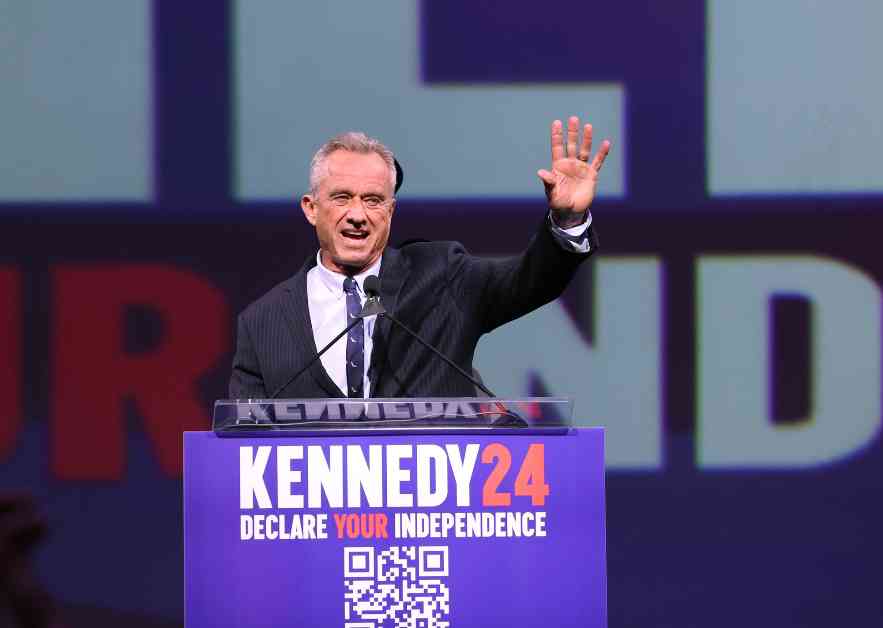RFK Jr. Agrees to Withdraw from Nevada Presidential Ballot
Robert F. Kennedy Jr. has come to an agreement with Nevada state Democrats to remove himself from the state’s presidential ballot as an independent candidate. This decision follows a lawsuit filed by the Democrats to have Kennedy kicked off the ballot. The deal between Kennedy’s campaign and the Nevada Democratic Party will see him withdrawn from the ballot and the lawsuit dismissed.
Kennedy had previously suspended his campaign for president and attempted to withdraw from the ballot in swing states, including Nevada. However, his campaign missed the deadline to do so in Nevada, leading to the lawsuit by the state Democrats as the only means to remove him from the ballot. Both parties reached an agreement this week to drop the lawsuit and remove Kennedy from the ballot, pending approval from Carson City District Court Judge James Russell.
The agreement outlines that Kennedy and his running mate Nicole Shanahan had filed a petition to gain ballot access, but will now no longer appear on the ballot. The dismissal of the lawsuit with prejudice means that it cannot be brought back to court. Paul Rossi, a Kennedy campaign ballot access attorney, stated that withdrawing their objections to the petition was the easiest way to come off the ballot, which was their ultimate goal.
Legal Battle Surrounding Kennedy’s Ballot Access
The lawsuit by the Nevada Democratic Party argued that Kennedy’s affiliation with other political parties violated the state’s legal requirements for independent candidates. At the time of the lawsuit, Kennedy was a registered Democrat in New York and is running as a member of a third party in other states. The executive director of the Nevada Democratic Party, Hilary Barrett, emphasized the importance of candidates playing by the rules and stated that Kennedy’s campaign did not meet the necessary requirements to run as an Independent non-affiliated party candidate in Nevada.
Kennedy’s initial ballot petition was deemed invalid for not including a running mate as required by Nevada law. His campaign argued that they were operating on faulty advice from the secretary of state’s office. Despite facing legal challenges, Kennedy’s campaign managed to gather enough signatures on their third petition to qualify for the ballot, overcoming attempts to block their access in Nevada.
The electoral implications of Kennedy’s removal from the ballot are uncertain. Polling data from RealClearPolitics suggests that former President Donald Trump’s lead over Vice President Kamala Harris in Nevada increases when third-party candidates, including Kennedy, are included. Kennedy had been polling around 5 percent of the vote share in Nevada, with Trump’s lead growing from 1.4 percent to 2.2 percent with Kennedy’s absence.
An internal campaign memo from Trump’s pollster revealed that Kennedy supporters in Nevada overwhelmingly favored Trump over Harris. The data showed 66 percent of Kennedy supporters backing Trump, 16 percent supporting Harris, and the rest undecided. Kennedy’s endorsement of Trump and subsequent appointment as a co-chair on his transition team have raised questions about his political affiliations and the impact on the upcoming election.
Kennedy’s Independent Campaign
Robert F. Kennedy Jr., known for his environmental activism and promotion of anti-vaccine conspiracies, had been running a freewheeling independent campaign for president after initially running as a Democrat. During his campaign, Kennedy made two stops in Las Vegas, including a rally in February and an appearance at the annual FreedomFest conference.
Kennedy’s unpredictable campaign style and controversial views have garnered both support and criticism. His endorsement of Trump and subsequent involvement in the former president’s transition team have further fueled debates about his political stance and the implications for the upcoming election. Despite the legal battles surrounding his ballot access, Kennedy remains a polarizing figure in the political landscape.
In conclusion, Robert F. Kennedy Jr.’s agreement to withdraw from the Nevada presidential ballot marks the end of a tumultuous legal battle with state Democrats. The implications of his removal from the ballot remain uncertain, with polling data suggesting a potential impact on the race between Trump and Harris in Nevada. Kennedy’s independent campaign and political affiliations continue to spark discussions about his role in the upcoming election and the broader political landscape.

